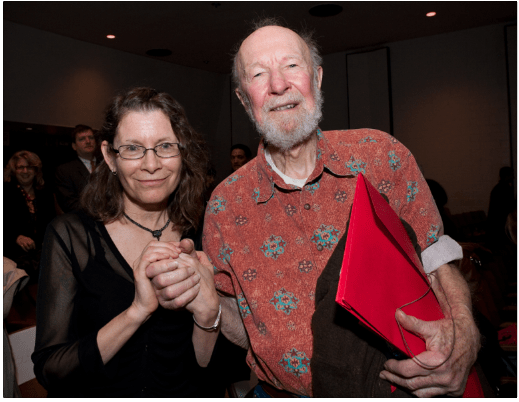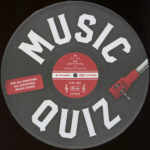Musicians become institutions simply because they are around for a long time. The music they create has become the soundtrack of people’s lives, deeply associated with happy and sad events and more subtly marking the passage of time. In many cases musicians make their social and political feelings known, but seldom are they dominant.
A few major musicians’ activism was equal to – or even more pronounced — than their musical accomplishments. Woody Guthrie, of course, was one. Richie Havens was another. And of course there is Pete Seeger.
Seeger was unique in that he embodied activism. Of course, he ran singalongs, was a voice for compassion and empathy and, all along the way, was a tremendous singer and banjo player. What tends to get lost is that Seeger “walked the walk.”
Indeed, that phrase comes up in an interview The Daily Music Break did last week with Meryl Danziger, the author of “Sing It! A Biography of Pete Seeger,” a book aimed at younger readers. (Here is a link to a description of the book and here is one to the Amazon link).
- Meryl Danziger on Pete Seeger 29:14
“Walking the walk” was used in relation to the guts Seeger showed in facing down the House Un-American Activities Committee (HUAC) in August, 1955. The McCarthy era was a tumultuous time — similar in some ways to today — and Seeger withstood tremendous pressure, including the real prospect of going to prison. Other celebrities took the easy way out.
Here is part of the testimony. Rep. Francis Walter was the committee chairman and Frank Tavenner and Gordon Scherer were committee staffers:
MR. TAVENNER: The Committee has information obtained in part from the Daily Worker indicating that, over a period of time, especially since December of 1945, you took part in numerous entertainment features. I have before me a photostatic copy of the June 20, 1947, issue of the Daily Worker. In a column entitled “What’s On” appears this advertisement: “Tonight-Bronx, hear Peter Seeger and his guitar, at Allerton Section housewarming.” May I ask you whether or not the Allerton Section was a section of the Communist Party?
MR. SEEGER: Sir, I refuse to answer that question whether it was a quote from the New York Times or the Vegetarian Journal.
MR. TAVENNER: I don’t believe there is any more authoritative document in regard to the Communist Party than its official organ, the Daily Worker.
MR. SCHERER: He hasn’t answered the question, and he merely said he wouldn’t answer whether the article appeared in the New York Times or some other magazine. I ask you to direct the witness to answer the question.
CHAIRMAN WALTER: I direct you to answer.
MR. SEEGER: Sir, the whole line of questioning—
CHAIRMAN WALTER: You have only been asked one question, so far.
MR. SEEGER: I am not going to answer any questions as to my association, my philosophical or religious beliefs or my political beliefs, or how I voted in any election, or any of these private affairs. I think these are very improper questions for any American to be asked, especially under such compulsion as this. I would be very glad to tell you my life if you want to hear of it.
Here is a full transcript.
Most musicians are known for what they produce. They play an instrument, sing, compose, write lyrics or in some other ways gain fame, accolades and, in rare cases, make a good living.

A few go beyond that. They are as important for who they are as what they do. Their “back stories”– their causes or something else about them — go beyond the music, though that is the bedrock on which the notoriety is based.
Meryl, who is the Founder and Director of Music House, came to know Seeger in a funny and no doubt characteristic way: She wrote a play about Seeger that her class at a New York City elementary was to perform. The kids insisted on inviting Seeger. She reached out – and he showed up, banjo in hand. Seeger led the class in song after the presentation. This led to a long-term relationship during which the two worked to turn the play into the book.
Below the Amazon box is a video of Seeger, his grandson and Bruce Springsteen leading the crowd in “This Land is Your Land” at Barack Obama’s first inauguration in 2009.
[su_box title=”Get Great Music, Support The Daily Music Break” style=”soft” box_color=”#fcfee4″ title_color=”#030728″ radius=”10″]If you shop for music or anything else at Amazon, please consider going their directly from one of the many Amazon links at this site. Doing so supports TDMB because we get a small percentage on anything you buy. The price you pay remains the same. Please consider it. It would be greatly appreciated.[/su_box]










Recent Comments